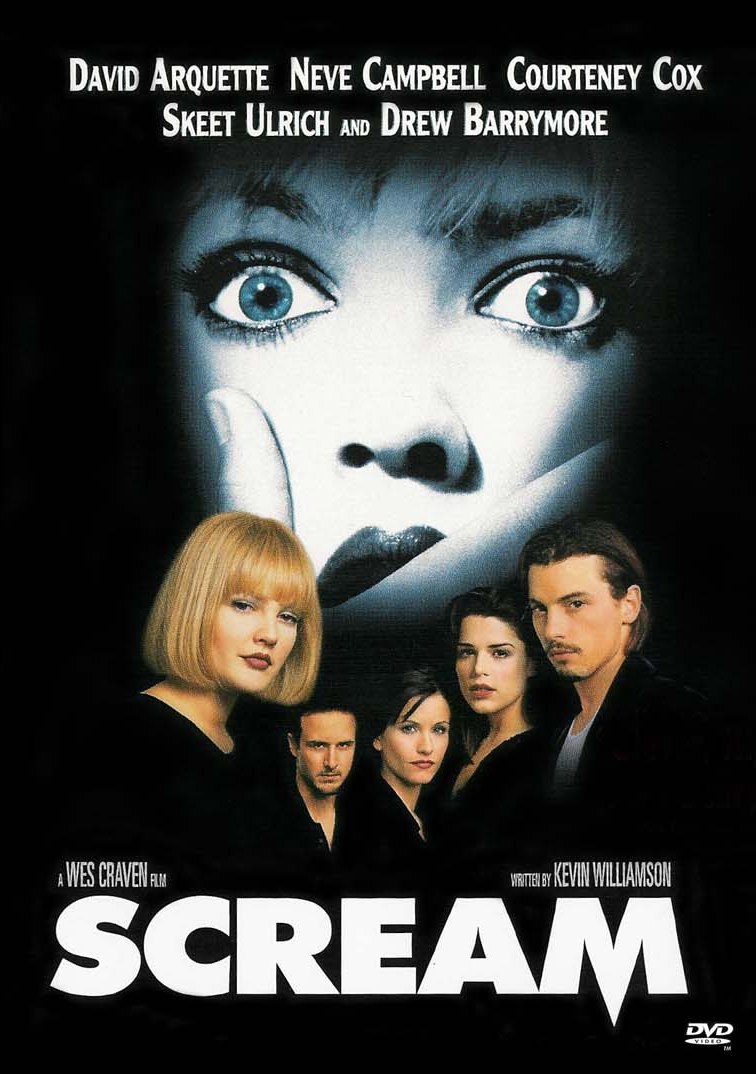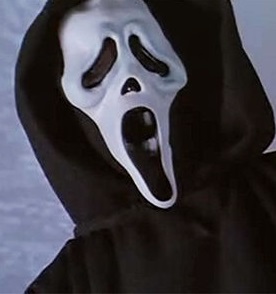 In the now-classic, ingenious opening scene of Wes Craven’s Scream, Casey Becker howls at her assailant that she’s seen Friday the 13th “20 goddamn times!” Pathetic, Casey! Because I’ve seen Scream 103 times. I know this because I was 12. And I counted.
In the now-classic, ingenious opening scene of Wes Craven’s Scream, Casey Becker howls at her assailant that she’s seen Friday the 13th “20 goddamn times!” Pathetic, Casey! Because I’ve seen Scream 103 times. I know this because I was 12. And I counted.
The genre subverting (and genre-saving!) film turned 20 this month, proving that it is old, and that I am even older. I can still remember my first outing: Watching in a theater with friends, I straight up tripped out after the opening Casey/Steve death scene. But there were girls present, so the urge to follow those already fleeing the room with flailing arms and covered eyes had to be suppressed. But still, it didn’t change the fact that I’d never feel safe home alone at night for years to come…and that Scream would become one of my all-time faves, changing how I watched movies, influencing countless other filmmakers, and spawning a plethora of wannabe ripoffs in its wake. Imitation is the sincerest form of flattery, after all.
By the mid-90’s, horror was at an all-time low. Movies like Halloween: The Curse of Michael Myers and John Carpenter’s Village of the Damned were consistently under-performing despite franchise fanfare and horror-icon statuses. It was a new decade and gone was the slasher heyday of the early 80’s, when Carpenter’s original Halloween transformed the direction and methods of horror production. Slashers became the new trendy scare, until eventually, they became watered down, sparking the very first slasher spoof, Student Bodies. Documentaries have even chronicled the sub-genre’s rise and fall. Stemming from these various failures and fallen graces, Scream hit at the most opportune time. Make no mistake:
Horror wouldn’t be what it is today without Scream.
In fact, I’d go so far to say that if you don’t understand Scream‘s importance, then you don’t really understand horror.
It all started with a witty, intelligent script from Kevin Williamson, who sold it to Dimension Films for $400,000. The draw: the movie’s characters were all self-aware…of themselves and of horror’s history. Tropes were openly discussed and abandoned, or in some cases, followed anyways for reasons both ironic and comedic. Scream also had a healthy dose of meta elements, effectively calling bullshit on its own genre; yet, it paid homage to everything that came before it while simultaneously satirizing it. It was scary as hell, but had lots of humor, rounded out with a fresh, talented cast of actors who were all just about to peak. In fact, one of its biggest stars at the time, Drew Barrymore, was the one casting that eventually led Craven to sign on to the project after declining it a couple times over. It would end up being a game-changing decision for his career.
 Barrymore was initially approached to play Sidney Prescott, the lead role later granted to Neve Campbell. But Barrymore decided to play Casey, therefore turning viewers’ expectations on their heads after Casey Becker was killed off just 15 minutes into the film. It was a neo-Psycho moment that had everyone talking, and arguably, it was this death scene that set the stage for what Scream would become. It was a new game with new rules to heed (as Randy Meeks would later explain). Everything about Scream flipped the script, stripping viewers of everything we had known about horror up to that point. And it all started with one little question:
Barrymore was initially approached to play Sidney Prescott, the lead role later granted to Neve Campbell. But Barrymore decided to play Casey, therefore turning viewers’ expectations on their heads after Casey Becker was killed off just 15 minutes into the film. It was a neo-Psycho moment that had everyone talking, and arguably, it was this death scene that set the stage for what Scream would become. It was a new game with new rules to heed (as Randy Meeks would later explain). Everything about Scream flipped the script, stripping viewers of everything we had known about horror up to that point. And it all started with one little question:
Do you like scary movies?
Scream produced some solid sequels as well, and true to their predecessor, the series kept flipping that script. Scream 2 examined the altered rules for sequel films, while Scream 4, a part-reboot, part-sequel installment, provided a tongue-in-cheek look into reboots and re-interpretations of original films, adding additional layers of meta elements and building off of the original’s sturdy foundation. Both of these excelled in many ways despite their flaws, but are commendable chapters to the saga, overall. (As for 3…well, every series has its worst. Also: Courteney Cox’s haircut was the most terrifying part.)
If you didn’t find Scream to be scary AF, maybe you weren’t around to witness it in that fragile mid-late 90’s culture. That level of genre deconstruction that Scream was responsible for was often imitated and never duplicated. It reset the horror genre when it needed it the most. It redefined the rules of creating and surviving a horror movie. It was both influenced by history, but also an influencer of the future.
When Craven passed away last year, Scream was one of the most noted films in his filmography listed in obits and tributes. There’s a reason for that. Scream is just as important to Craven’s legacy as it is to horror. While it’s importance is undoubted, not many movies can even match its sheer staying power. It was the right movie at the right time, with the right script, director and cast. These stars don’t always align perfectly in Hollywood.
Scream was and always will be the horror classic that redeemed the slasher film, while redefining the fundamentals of horror cinema. For this, it should be forever celebrated. (The TV series can still fuck itself, though.)


